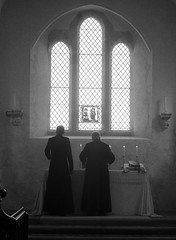
Mass at North Stoke
Originally uploaded by seadipper
I have just finished a week’s retreat. I stayed in a guesthouse run by a community of nuns. It was very comfortable and good value. My room had a view over a lake. The nuns meet in the church to sing the office four times a day, which they do beautifully, in the vernacular, which unlike the English translations, are true to the Latin.
The median age of the sisters is, I would guess, on the wrong side of fifty, which is not disastrous but nevertheless worrying if the continued existence of the community is to be assured.
The interesting thing is that this community survived the upheavals of the 1970s, despite, or possibly because it adapted to the changes that followed on from Vatican II. The question that comes to my mind is whether there is a need for further changes in the near future. Most, if not all, of the community members seem to have come from another country, which is not in itself significant, but it must be a disappointment that there there have been few, if any, local vocations. Could it be that the changes that seemed so up-to-date forty years ago appear out of date to the young people of today?
Things are moving on. Present day trends need to be examined and opportunities grasped. For example, while I was away, I attended a concert in the local (Protestant) church, a medieval building which had originally been a Catholic church. The performance, by two women, consisted of Gregorian chant settings in Latin, of the sort that used to be sung, usually badly, every Sunday. It was extraordinary. The singers had worked out a way of exciting the natural resonances of the building, which effectively added a third voice. The sound was out of this world, with just the two singers filling the enormous space with sound. I have never heard of such a technique before, even though I have been to many courses in Gregorian chant over the years. On thinking about it, it seems obvious that this would have been the normal style of singing; the performers thought that the building had been deliberately constructed for just this purpose.
Music in the liturgy is only one aspect of the way times are changing. In the English-speaking world, problems with translations, and the increasing movement of people, mean that the use of Latin is an effective way of side-stepping all the potential problems and sources of conflict. There is a growing sense that being able to “understand” the words of the liturgy is a delusion, since it is the action as a whole that counts and this can only be understood if the liturgy is studied in depth as part of catechesis; its meaning is not something that can be grasped at a single hearing on the basis of the words spoken at the time, even with a good translation. There is also the matter of the general conduct of the liturgy and the ordering and architecture of churches. Priests and congregations are rediscovering the value of having everyone facing towards the east, which is not to be dismissed as “the priest turning his back on the people”; the liturgy becomes a procession led by the priest. Also entailed in these changes is an renewed appreciation of traditional designs of vestments, in contrast to the bland lengths of furnishing fabrics that have passed for vestments since the 1970s. And of course there is the persistence and rediscovery of the ancient rite of the Mass, now designated as the Extraordinary Form and freed from restrictions as to its use. It is certainly the case that in most countries in Western Europe, the changes of the 1970s did not lead to a reinvigoration of the church – quite the reverse, in fact, even if other factors are taken into consideration.
What has this to do with vocations? Possibly nothing but perhaps quite a lot. Reputedly, those orders which follow tradition more closely have been attracting more vocations in recent years. This ultra-conservative trend would be worrying if it were driven by the same desire for certainties as leads young people into fundamentalism – as if putting on the right clothes and reciting the right formulae is the way to salvation. On the other hand, it is surely only common sense and can do no harm to question and re-evaluate the radical changes that were made a generation ago.
Kommentarer